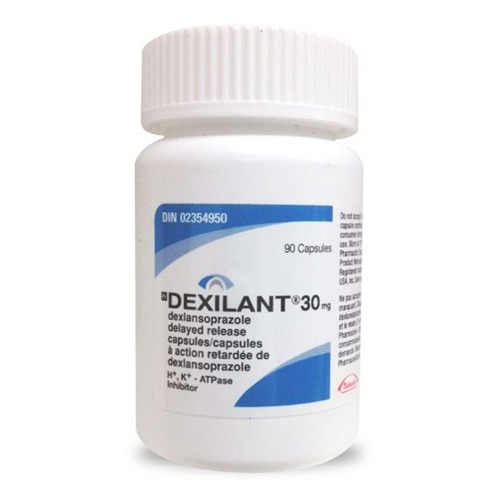Dosage of Dexilant
The recommended dosage is usually 60 mg once daily, taken with or without food. However, the dosage may vary depending on the individual's medical condition and response to treatment. For patients who require additional acid suppression, a dose of 30 mg may be prescribed.
The medication should be taken at least 30 minutes before a meal. The capsule should be swallowed whole, and not chewed or crushed. For patients who have difficulty swallowing, the orally disintegrating tablet may be a suitable alternative.
How Dexilant Works
Dexilant works by decreasing the amount of acid produced in the stomach. It does this by inhibiting the enzyme responsible for acid secretion, thereby reducing the overall acidity in the stomach. This helps to relieve symptoms of GERD and allows any existing damage to heal.
The delayed-release formulation ensures that the medication is not broken down until it reaches the small intestine. This allows the medicine to be absorbed properly.
What Dexilant is Used For
Dexilant is primarily used for the treatment of GERD in adults. It may also be prescribed to heal erosive esophagitis. This is a condition where the lining of the esophagus becomes damaged due to prolonged exposure to stomach acid.
Dexilant may be used as maintenance therapy for patients with GERD who require long-term treatment. It should not be used by individuals under 12 years old unless specifically directed by a doctor.
Precautions and Warnings
Before prescribing Dexilant, your doctor will need to know about any other medications you are taking. There may be potential drug interactions with certain antibiotics, anticoagulants, and anti-seizure medications.
Dexilant should not be taken together with other PPIs or at high doses as this can increase the risk of side effects. Patients with kidney problems should also exercise caution when taking dexilant as it is primarily eliminated through the kidneys. Long-term use of PPIs may also increase the risk of vitamin B-12 deficiency.
It may also increase your risk of fractures in the hips, wrist or spine. This is more common for individuals that are 50 years of age or older.
Side Effects of Dexilant
Some common side effects of Dexilant include diarrhea, nausea, and abdominal pain. Joint pain has also been reported in some patients. If you experience any serious side effects such as severe stomach pain or difficulty breathing, seek medical attention immediately.
It is important to store it at room temperature and avoid exposure to excessive heat or moisture. If you are prescribed Dexilant for longer than 3 months, your doctor may recommend periodic monitoring. They may need to assess the drug's effectiveness. They can check for any potential adverse reactions.
In conclusion, Dexilant is an effective medication for the treatment of GERD and other related conditions. It is important to follow the prescribed dosage and precautions to ensure safe and effective use.
Side effects may include (but are not limited to):
- unusual bleeding or bruising
- vomiting
- chest pain, discomfort, tightness, or heaviness
- rash, hives
- incoherent speech
- watery or bloody diarrhea
- numbness or tingling in the hands, feet, or lips
- fever
- sweating
- difficult or labored breathing
- fast, irregular, pounding, or racing heartbeat or pulse
- diarrhea
- joint pain, stiffness, or swelling
- muscle pain, cramps, or weakness
- lightheadedness, dizziness, or fainting
- swelling of the eyelids, face, lips, hands, or feet
- headache
- vomiting of blood or material that looks like coffee grounds
- swollen, painful, or tender lymph glands in the neck, armpit, or groin
- nausea
- confusion
- shakiness in the legs, arms, hands, or feet
- pounding in the ears
- pain or discomfort in the arms, jaw, leg, back, or neck
- continuing stomach pain
Can Dexilant be taken with other medications?
Disclose all of your prescription, non-prescription drugs and vitamins and minerals. You can take other drugs with Dexilant but your doctor would first need to determine your allergies and check for drug interactions.
Is Dexilant safe for long-term use?
You should talk to your doctor if your symptoms persist, despiste treatment, for more than 6 months. You may have an increased risk of adverse reactions including fractures.
How should Dexilant be stored?
Dexilant tablets should be stored at room temperature, away from moisture and heat. Make sure to keep the medication out of reach of children and animals.
Can teenagers take Dexilant?
Dexilant is approved for use in patients aged 12 and above. For patients between the ages of 12 and 17, the recommended dosage is based on weight. It should not be used by children under 12 years old without medical supervision.
Can Dexilant cause joint pain?
In rare cases, Dexilant may cause joint pain as a side effect. If you experience any new or worsening joint pain while taking Dexilant, contact your doctor for medical advice.
